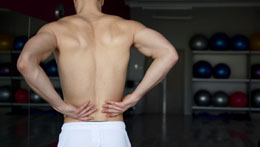High-intensity exercising and weightlifting can cause soreness in muscles. In this article, you will find the causes and remedies for muscle soreness on lifting weights.

If you wish to have those much coveted six pack abs, you need to work out regularly. Rigorous working out with weights is one of the best methods to build muscles. It is said that lifting weights is no child's play, and not everyone's cup of tea. This is because it needs a lot of hard work and determination to carry out the workouts. At the same time, there may be certain side effects associated with rigorous workouts like spraining of the ligaments, muscle strain or soreness of muscles. Let us take a look at them in detail.
Sore Muscles Causes
Muscle soreness after lifting weight is a common phenomenon. If you wish to build muscles effectively, and become stronger, you need to increase your endurance and also increase the duration or nature of your weightlifting. For e.g., if a person runs the same distance in the same time every day, and continues this ever day, he may not increase his speed of running ever. At the same time, he will never experience any soreness because he has not stressed his muscles to run faster, at all. Similar is the case while lifting weights. With every passing workout, you need to stress the muscles to build muscles effectively. Hence, when you experience soreness in arms while lifting weight, this is because the muscles have been stressed to their limit. The person suffers from muscle soreness 20-24 hours after the workout. This is medically known as DOMS (Delayed Onset Muscle Soreness). The actual soreness is due to a minor tear in the muscles or due to building up of metabolic wastes in the muscles. It is also said that building up of lactic acid is also one of the reasons for causing sore muscles after lifting weights. However, there is no proof to support this claim. Now, if you are experiencing this discomfort causing condition, you may be looking for measures to reduce the soreness and pain. Let us take a look at the remedies in detail.
Sore Muscle Relief
In most cases, as mentioned above, it has been found that muscle soreness after lifting weights occurs in people who undergo strenuous exercises after a long time interval. Therefore, one of the best preventive measure is to avoid working out like a pro in the initial stages. You should work out with weights only under the guidance of a trainer, and should not try to imitate professional bodybuilders. Now, if you are suffering from muscle soreness, you may follow any of these remedies for quick relief:
- Ice or heat, both works to get rid of the muscles soreness caused after lifting weights. Applying ice packs is the simplest and one of the most effective ways to treat soreness. On the other hand, using a heat pack or having a warm bath can also help in treating sore muscles. However, you should note that a heat pack should never used if you have applied a topical ointment as it can lead to burns.
- There are several anti-inflammatory medications and ointments available in market which can be used. However, before taking them, you should make sure that they do not cause any side effects.
- You can try simple and careful stretching, or massage, to ease the pain and get rid of soreness. It is also recommended that massage should be done by an experienced person.
- Your trainer or nutritionist may even advise you to make changes in the diet to quickly regain all the lost nutrients. You should have a diet rich in carbohydrates and proteins, as they help in gaining energy and building muscles respectively.
- Lastly, there is no other effective method for treating sore muscles after workout than taking rest. Taking complete rest is the best method to treat the soreness and recover.
Although a common phenomenon, muscle soreness can be prevented or reduced to a great extent if you follow proper warm-up and workout routine. Also, one should remember that it is not wise to make severe changes in diet and exercise routine in a short duration. Take care!


 If you wish to have those much coveted six pack abs, you need to work out regularly. Rigorous working out with weights is one of the best methods to build muscles. It is said that lifting weights is no child's play, and not everyone's cup of tea. This is because it needs a lot of hard work and determination to carry out the workouts. At the same time, there may be certain side effects associated with rigorous workouts like spraining of the ligaments, muscle strain or soreness of muscles. Let us take a look at them in detail.
If you wish to have those much coveted six pack abs, you need to work out regularly. Rigorous working out with weights is one of the best methods to build muscles. It is said that lifting weights is no child's play, and not everyone's cup of tea. This is because it needs a lot of hard work and determination to carry out the workouts. At the same time, there may be certain side effects associated with rigorous workouts like spraining of the ligaments, muscle strain or soreness of muscles. Let us take a look at them in detail.